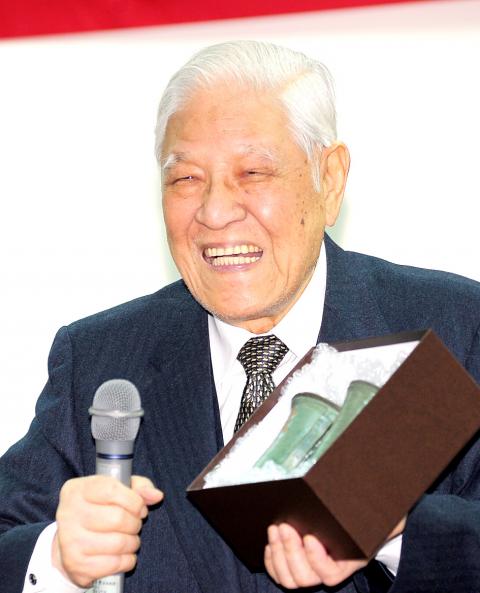Former president Lee Teng-hui (李登輝) yesterday said he is in favor of lowering the threshold for constitutional amendments and the voting age, and suggested that a referendum on whether the Constitution should be amended to replace the current semi-presidential system of government with a parliamentary system be staged alongside next year’s presidential election.
Lee made the remarks in a speech, titled “Constitutional reform is Taiwan’s only way out,” he delivered to the Legislative Yuan Press Club.
Calls from across party lines and from many civic groups for constitutional changes point to a rare opportunity to unite a divided public and put reform into practice, he said.

Photo: CNA
Lee proposed a two-stage reformation process. The first stage should include reducing the threshold for constitutional reform, rectifying the Referendum Act (公民投票法) and lowering the voting age to 18 — among other proposed amendments. A referendum on the draft amendments could then be held to seek public endorsement.
The current threshold for amending the Constitution requires the support of one-quarter of the Legislative Yuan to put forward an amendment, three-quarters of the legislators to attend a meeting to deliberate the proposed amendment and then three-quarters of the attendees to approve the proposal.
If approved by lawmakers, the proposed amendment must be put to a referendum, which requires half of the entire electorate to vote in favor for it to be considered passed.
In terms of changing Taiwan’s government structure, Lee said the number of Legislative Yuan seats must be increased and the legislative electoral system be overhauled, while clear lines of accountability between the president and premier must be drawn.
The president should be entitled to direct national defense and foreign affairs, including cross-strait relations, under the supervision of the legislature, Lee said.
He called for the legislators to pass draft amendments for such reforms in the first half of this year so that the proposals could then be put to a referendum next year to seek a public mandate.
The former president said he would personally facilitate talks between Chinese Nationalist Party (KMT) Chairman Eric Chu (朱立倫) and Democratic Progressive Party Chairperson Tsai Ing-wen (蔡英文) after the Lunar New Year holidays, as well as the leaders of other parties, to set out a timetable for constitutional reform.
Chu and Tsai are responsible for laying out specific claims to constitutional reform to bring about new changes, rather than taking advantage of the situation to further their political ambitions, Lee said.

The CIA has a message for Chinese government officials worried about their place in Chinese President Xi Jinping’s (習近平) government: Come work with us. The agency released two Mandarin-language videos on social media on Thursday inviting disgruntled officials to contact the CIA. The recruitment videos posted on YouTube and X racked up more than 5 million views combined in their first day. The outreach comes as CIA Director John Ratcliffe has vowed to boost the agency’s use of intelligence from human sources and its focus on China, which has recently targeted US officials with its own espionage operations. The videos are “aimed at

STEADFAST FRIEND: The bills encourage increased Taiwan-US engagement and address China’s distortion of UN Resolution 2758 to isolate Taiwan internationally The Presidential Office yesterday thanked the US House of Representatives for unanimously passing two Taiwan-related bills highlighting its solid support for Taiwan’s democracy and global participation, and for deepening bilateral relations. One of the bills, the Taiwan Assurance Implementation Act, requires the US Department of State to periodically review its guidelines for engagement with Taiwan, and report to the US Congress on the guidelines and plans to lift self-imposed limitations on US-Taiwan engagement. The other bill is the Taiwan International Solidarity Act, which clarifies that UN Resolution 2758 does not address the issue of the representation of Taiwan or its people in

US Indo-Pacific Commander Admiral Samuel Paparo on Friday expressed concern over the rate at which China is diversifying its military exercises, the Financial Times (FT) reported on Saturday. “The rates of change on the depth and breadth of their exercises is the one non-linear effect that I’ve seen in the last year that wakes me up at night or keeps me up at night,” Paparo was quoted by FT as saying while attending the annual Sedona Forum at the McCain Institute in Arizona. Paparo also expressed concern over the speed with which China was expanding its military. While the US

SHIFT: Taiwan’s better-than-expected first-quarter GDP and signs of weakness in the US have driven global capital back to emerging markets, the central bank head said The central bank yesterday blamed market speculation for the steep rise in the local currency, and urged exporters and financial institutions to stay calm and stop panic sell-offs to avoid hurting their own profitability. The nation’s top monetary policymaker said that it would step in, if necessary, to maintain order and stability in the foreign exchange market. The remarks came as the NT dollar yesterday closed up NT$0.919 to NT$30.145 against the US dollar in Taipei trading, after rising as high as NT$29.59 in intraday trading. The local currency has surged 5.85 percent against the greenback over the past two sessions, central